Published in Nacional number 632, 2007-12-20
CROATIAN RIFLE ON CROATIAN SHOULDERS
Croatian boom in the military industry
EVEN THOUGH MANY CLAIM THAT ENTRANCE TO NATO means purchasing military equipment from the west, the real truth is that joining the North Atlantic Treaty Organisation will bring a real boom to the Croatian military industry and six thousand new jobs
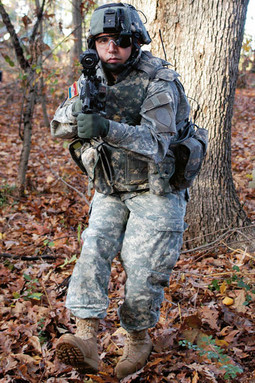 CAMAFLOUGE UNIFORMS, jackets, shirts and windbreakers are created by the Cateks company from Cakovec, while the ceremonial and work uniforms are created by Varteks from Varazdi The Defence Ministry recently signed a contract with the Croatian company HS Product from Karlovac for financing the production of 50 assault rifles valued at 4.5 million kuna and made a very clear point that they are seriously counting on equipping Croatian soldiers with nationally produced rifles which have already shown good results in the first round of testing. Of course, they also plan the production of 5.56 mm calibre ammunition. Therefore, Croatia will never have to depend on anyone in arming the basic and most significant part of the army, the infantry.
CAMAFLOUGE UNIFORMS, jackets, shirts and windbreakers are created by the Cateks company from Cakovec, while the ceremonial and work uniforms are created by Varteks from Varazdi The Defence Ministry recently signed a contract with the Croatian company HS Product from Karlovac for financing the production of 50 assault rifles valued at 4.5 million kuna and made a very clear point that they are seriously counting on equipping Croatian soldiers with nationally produced rifles which have already shown good results in the first round of testing. Of course, they also plan the production of 5.56 mm calibre ammunition. Therefore, Croatia will never have to depend on anyone in arming the basic and most significant part of the army, the infantry.
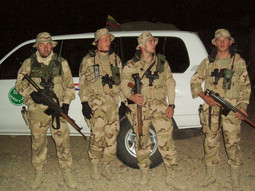 THE CROATIAN MILITARY in their mission to Afghanistan: Croatia contributes to international stability and security This will have a great economic effect because 500 new employees will work in the project. The Croatian assault rifle is only one example of including the national military industry in the modernization of the Armed Forces. The Croatian military will receive 80% of their military equipment and armament from national manufacturers, which completely opposes the claims that entrance and full membership to NATO has its price, which is purchasing western armament and military equipment.
THE CROATIAN MILITARY in their mission to Afghanistan: Croatia contributes to international stability and security This will have a great economic effect because 500 new employees will work in the project. The Croatian assault rifle is only one example of including the national military industry in the modernization of the Armed Forces. The Croatian military will receive 80% of their military equipment and armament from national manufacturers, which completely opposes the claims that entrance and full membership to NATO has its price, which is purchasing western armament and military equipment.
Even though there is an intention to spend a large amount of money on modernization and armament, and the impression was made to the public that the Armed Forces is only a large consumer, they have been the direct initiator for the creation of new jobs in Croatia and large investments for the past several years, and based on the size of all projects, nearly 6000 Croatian citizens will be employed directly or indirectly over the next decade. The Croatian military will, in that sense, become an initiator in the development of Croatian science and the economy, as well as foreign investments, especially in national military production.
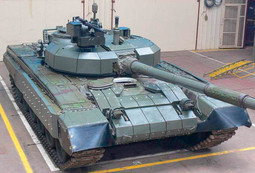 THE M-84D TANK, a product of Djuro Djakovic from Slavonski Brod, will be the backbone of the Croatian Armed Forces The inclusion and strengthening of the national military industry and companies from the civil sector in the armament and modernization of the Croatian military will take several years. That can especially be seen in the example of equipping Croatian soldiers. The helmets are created by the Sestan-Busch company from Prelog, the camouflage uniforms, jackets, shirts and windbreakers are made by Cateks from Cakovec, the ceremonial uniform and work clothes are made by Varteks from Varazdin, and the boots are manufactured by Jelen from Cakovec and Borovo from Borovo. Bulletproof vests are made by national company Kroko International under the trademark Kroko-M120; apart from protecting the soldiers from bullets of varying calibres, it is also used to carry equipment and personal items on the vest, and in the basic M120 set, there is a cape, arm shields, a radio pocket and a pocket for a protective mask. Additional equipment can cover six types of charger cases, ammunition cases, one or two layer bomb pockets, a grenade case, five types of holsters, a water bottle, a bag for small items, and a bulletproof hip shield. Of course, one must also mention the Croatian VHS assault rifle and the Croatian HS2000 pistol. It is completely clear that the Croatian soldiers will be dressed from head to toe and equipped by products made by national companies, which is not normal among NATO members. And not only that, all additional equipment for the soldiers on the field will also be a part of the Croatian production program. It can be said that the Croatian military, in most large projects which are dedicated to the modernization and provision of expensive armament, will have a large part of equipment and armament which is produced nationally. The newest version of the M-84AB tank, and today’s M-84D tank, which was produced for the needs of the former Yugoslav National Army by the Djuro Djakovic company from Slavonski Brod, will be a manufacturer of armoured units in the Croatian military in the future. When considering Djuro Djakovic and Croatian tanks, the modernization of 150 M-84 tanks from Kuwait is underway, and there is a need to manufacture 66 tanks which were never delivered to Kuwait from the time of the former Yugoslavia. That was a deal worth nearly 0 million USD. The value of the modernization per tank would total up to million USD, depending on the equipment package which Kuwait desires, while the price for a new tank is nearly .5 million USD. Croatia has decided to construct its own ships for the requirements of the Navy and some of the projects are being developed at the Brodarski Institute. Patrol boats are manufactured by Adria Mar in Zagreb and are shipped to Libya, and there is a plan to construct large corvettes for the same client. It was proven at the end of 2006 that Croatian shipbuilding is ready for construction of vessels for the needs of the Croatian Navy when the Croatian Navy fleet received a Korcula LM-51 minesweeper, constructed in the Montmontaza – Greben shipyard in Vela Luka based on a project designed at the Brodarski Institute. The Croatian Armed Forces have their own national system, Strela CRO-10, for anti-aircraft defence with a mid-altitude range, and the RBG-6 40 mm manual grenade thrower which is produced by Mettalic from Rijeka in cooperation with Zagreb’s Atira, and it is expected that in a year or two, they will begin to develop an automatic grenade thrower which will be mounted on armoured vehicles. The Infomare company from Zagreb was hired by the Defence Ministry for the creation and implementation of the entire IT system, and something similar was done by the company for the Internal Affairs Ministry. While the national military industry will secure operations for the modernization and equipping of the Croatian military for at least the next 20 or so years and increase the number of employees by several thousand, there is also an increase in foreign investments this year which is primarily connected to the modernization of the Armed Forces and investments in the defence industry through the offset program. In one such military project, Djuro Djakovic has secured its future because a contract was recently signed with Finnish Patria. The Defence Ministry and the Finnish company Patria and Djuro Djakovic – Special vehicles signed a contract on 11 October in the Ministry to attain 84 armoured Patria AMV 8x8 vehicles for the Croatian Armed Forces.
THE M-84D TANK, a product of Djuro Djakovic from Slavonski Brod, will be the backbone of the Croatian Armed Forces The inclusion and strengthening of the national military industry and companies from the civil sector in the armament and modernization of the Croatian military will take several years. That can especially be seen in the example of equipping Croatian soldiers. The helmets are created by the Sestan-Busch company from Prelog, the camouflage uniforms, jackets, shirts and windbreakers are made by Cateks from Cakovec, the ceremonial uniform and work clothes are made by Varteks from Varazdin, and the boots are manufactured by Jelen from Cakovec and Borovo from Borovo. Bulletproof vests are made by national company Kroko International under the trademark Kroko-M120; apart from protecting the soldiers from bullets of varying calibres, it is also used to carry equipment and personal items on the vest, and in the basic M120 set, there is a cape, arm shields, a radio pocket and a pocket for a protective mask. Additional equipment can cover six types of charger cases, ammunition cases, one or two layer bomb pockets, a grenade case, five types of holsters, a water bottle, a bag for small items, and a bulletproof hip shield. Of course, one must also mention the Croatian VHS assault rifle and the Croatian HS2000 pistol. It is completely clear that the Croatian soldiers will be dressed from head to toe and equipped by products made by national companies, which is not normal among NATO members. And not only that, all additional equipment for the soldiers on the field will also be a part of the Croatian production program. It can be said that the Croatian military, in most large projects which are dedicated to the modernization and provision of expensive armament, will have a large part of equipment and armament which is produced nationally. The newest version of the M-84AB tank, and today’s M-84D tank, which was produced for the needs of the former Yugoslav National Army by the Djuro Djakovic company from Slavonski Brod, will be a manufacturer of armoured units in the Croatian military in the future. When considering Djuro Djakovic and Croatian tanks, the modernization of 150 M-84 tanks from Kuwait is underway, and there is a need to manufacture 66 tanks which were never delivered to Kuwait from the time of the former Yugoslavia. That was a deal worth nearly 0 million USD. The value of the modernization per tank would total up to million USD, depending on the equipment package which Kuwait desires, while the price for a new tank is nearly .5 million USD. Croatia has decided to construct its own ships for the requirements of the Navy and some of the projects are being developed at the Brodarski Institute. Patrol boats are manufactured by Adria Mar in Zagreb and are shipped to Libya, and there is a plan to construct large corvettes for the same client. It was proven at the end of 2006 that Croatian shipbuilding is ready for construction of vessels for the needs of the Croatian Navy when the Croatian Navy fleet received a Korcula LM-51 minesweeper, constructed in the Montmontaza – Greben shipyard in Vela Luka based on a project designed at the Brodarski Institute. The Croatian Armed Forces have their own national system, Strela CRO-10, for anti-aircraft defence with a mid-altitude range, and the RBG-6 40 mm manual grenade thrower which is produced by Mettalic from Rijeka in cooperation with Zagreb’s Atira, and it is expected that in a year or two, they will begin to develop an automatic grenade thrower which will be mounted on armoured vehicles. The Infomare company from Zagreb was hired by the Defence Ministry for the creation and implementation of the entire IT system, and something similar was done by the company for the Internal Affairs Ministry. While the national military industry will secure operations for the modernization and equipping of the Croatian military for at least the next 20 or so years and increase the number of employees by several thousand, there is also an increase in foreign investments this year which is primarily connected to the modernization of the Armed Forces and investments in the defence industry through the offset program. In one such military project, Djuro Djakovic has secured its future because a contract was recently signed with Finnish Patria. The Defence Ministry and the Finnish company Patria and Djuro Djakovic – Special vehicles signed a contract on 11 October in the Ministry to attain 84 armoured Patria AMV 8x8 vehicles for the Croatian Armed Forces.
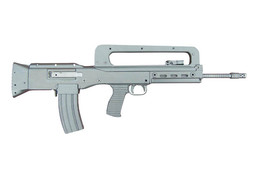 HE CROATIAN ASSAULT RIFFLE is a product of HS Product from Karlovac, which is currently manufacturing the first series This is a contract valued at €112 million, a little less than 1 billion kuna, and an offset contract was signed between the Economics Ministry and Patria, whereby the Finnish company has a responsibility to include Croatian companies and to invest in the Croatian economy for a value greater than the aforementioned contract. The greatest investment connected to the modernization of the Croatian military is still expected. This is the supply of fighter jets valued at 4 billion kuna, which the aircraft manufacturer has to return to the Croatian economy.
HE CROATIAN ASSAULT RIFFLE is a product of HS Product from Karlovac, which is currently manufacturing the first series This is a contract valued at €112 million, a little less than 1 billion kuna, and an offset contract was signed between the Economics Ministry and Patria, whereby the Finnish company has a responsibility to include Croatian companies and to invest in the Croatian economy for a value greater than the aforementioned contract. The greatest investment connected to the modernization of the Croatian military is still expected. This is the supply of fighter jets valued at 4 billion kuna, which the aircraft manufacturer has to return to the Croatian economy.
That is the legal responsibility connected to winning the tender and the aircraft supplier must find a way to return 4 billion kuna to Croatia by opening new factories and employing Croatian employees in the country, purchasing Croatian products, and making deals with Croatian companies in their home country. It should be said that the Croatian military, due to its international reputation and friendly relations with the United States, received a gift of million USD in military equipment within the military assistance program.
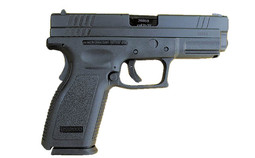 THE HS 2000, a Croatian pistol manufactured by HS Product from Karlovac, is the Croatian military’s standard equipment, and also a very profitable export product The American government have equipped two Croatian Mi-8 MTV-1 helicopters with modern navigational-communication and identification equipment valued at .5 million. 625 tactical SINCGARS radios have been supplied, one channel radio for infantry and the air force valued at .5 million, and Croatia also received a .6 million system for soldier training called the Miles-2000. This could not all be received for free if the foreign policy strategy was not directed at entrance to NATO. For all the aforementioned, it is clear that Croatia’s entrance to NATO can be completely justified economically. In four months in Bucharest, the NATO summit will be held where Croatia will be offered an invitation for full membership.
THE HS 2000, a Croatian pistol manufactured by HS Product from Karlovac, is the Croatian military’s standard equipment, and also a very profitable export product The American government have equipped two Croatian Mi-8 MTV-1 helicopters with modern navigational-communication and identification equipment valued at .5 million. 625 tactical SINCGARS radios have been supplied, one channel radio for infantry and the air force valued at .5 million, and Croatia also received a .6 million system for soldier training called the Miles-2000. This could not all be received for free if the foreign policy strategy was not directed at entrance to NATO. For all the aforementioned, it is clear that Croatia’s entrance to NATO can be completely justified economically. In four months in Bucharest, the NATO summit will be held where Croatia will be offered an invitation for full membership.
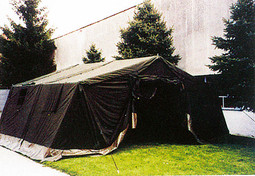 THE WERKOS COMPANY FROM OSIJEK produces tents for the Croatian Armed Forces With the mentioned date growing near, the purpose of the membership, expenses, influence on tourism, conditions which Croatia will have to accept to become a member, and the issue of having a referendum for the entrance of NATO are once again active on the Croatian political scene. A referendum is one of the key demands made by several political parties for entering a coalition with the next government. If in any case Croatian politicians did a serious job in analyzing the consequences of entering NATO, they could calculate that Croatia objectively would need to spend 3-4 more to remain neutral and remain outside of NATO. It is incontestable that Croatia will not have greater security for such a small amount of money. Slovenia today has three times lower defence expenditures as a full member of NATO than it had as a socialist republic in 1989 for the former Yugoslav National Army.
THE WERKOS COMPANY FROM OSIJEK produces tents for the Croatian Armed Forces With the mentioned date growing near, the purpose of the membership, expenses, influence on tourism, conditions which Croatia will have to accept to become a member, and the issue of having a referendum for the entrance of NATO are once again active on the Croatian political scene. A referendum is one of the key demands made by several political parties for entering a coalition with the next government. If in any case Croatian politicians did a serious job in analyzing the consequences of entering NATO, they could calculate that Croatia objectively would need to spend 3-4 more to remain neutral and remain outside of NATO. It is incontestable that Croatia will not have greater security for such a small amount of money. Slovenia today has three times lower defence expenditures as a full member of NATO than it had as a socialist republic in 1989 for the former Yugoslav National Army.
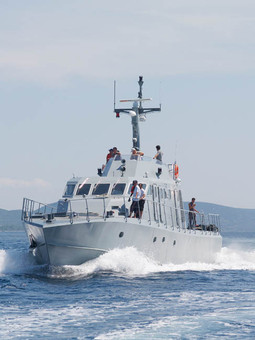 PATROL BOATS made by Rijeka’s Adria Mar are delivered to Libya, and there is a plan to construct corvettes for the same client As a full member, Croatia can not only be a consumer of services but a country which contributes to international stability and security. Croatian soldiers are currently located in the poorest countries in the world, so it cannot be said that they are protecting foreign capital. The current hypothesis that Croatian youth are dying to protect foreign interests and that Croatian mothers will not send their send their sons to world battlegrounds is complete nonsense. Croatia has abolished compulsory military service, there are not more cadets at the age of 18, and the Croatian military will be completely professionalized. Individuals employed in the Croatian military will be motivated by financial reasons, or simply because being a soldier suits their interests. As with the other mentioned professions, this is a risk, but the decision is made by people who want to do it.
PATROL BOATS made by Rijeka’s Adria Mar are delivered to Libya, and there is a plan to construct corvettes for the same client As a full member, Croatia can not only be a consumer of services but a country which contributes to international stability and security. Croatian soldiers are currently located in the poorest countries in the world, so it cannot be said that they are protecting foreign capital. The current hypothesis that Croatian youth are dying to protect foreign interests and that Croatian mothers will not send their send their sons to world battlegrounds is complete nonsense. Croatia has abolished compulsory military service, there are not more cadets at the age of 18, and the Croatian military will be completely professionalized. Individuals employed in the Croatian military will be motivated by financial reasons, or simply because being a soldier suits their interests. As with the other mentioned professions, this is a risk, but the decision is made by people who want to do it.
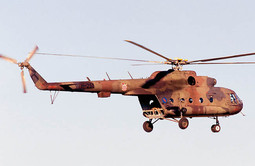 THE AMERICAN GOVERNMENT, in their military assistance program, equipped two Croatian Mi-8 MTV-1 helicopters with modern navigational-communication and identification equipment Among the public, extreme opinions often emerge that Croatia does not need a defence system so it is better to direct the monetary funds to food production instead of making cannons. Those opposing membership believe that the existence and development of the Armed Forces is an unnecessary attribute to a modern country in the third century. However, no one can offer any alternative for the protection of national security and they suggest undefined neutrality. Neutrality in today’s world is not possible to proclaim; it is allowed by international institutions. Neutrality would make the country multiply the expenditures for defence several times, which would decrease expenditures in health care, social security and education. Only Sweden, Ireland, Austria, Switzerland and Finland remain outside of NATO as neutral countries. The neutrality of Sweden and Switzerland is deeply rooted in the past and has lasted during both World Wars and the Cold War. Austria and Finland considered neutrality a factor for maintaining their own sovereignty: the first in 1955, after the large forces left the country, and the second due to the proximity of the then Soviet Union and the threat of the Soviet military power. Ireland did not want to join NATO so that Britain would not order and subordinate commands within NATO. However, all mentioned countries have already become a part of various European security associations, as a part of NATO’s Partnership for Peace program, therefore neutrality in the classical sense does not exist.
THE AMERICAN GOVERNMENT, in their military assistance program, equipped two Croatian Mi-8 MTV-1 helicopters with modern navigational-communication and identification equipment Among the public, extreme opinions often emerge that Croatia does not need a defence system so it is better to direct the monetary funds to food production instead of making cannons. Those opposing membership believe that the existence and development of the Armed Forces is an unnecessary attribute to a modern country in the third century. However, no one can offer any alternative for the protection of national security and they suggest undefined neutrality. Neutrality in today’s world is not possible to proclaim; it is allowed by international institutions. Neutrality would make the country multiply the expenditures for defence several times, which would decrease expenditures in health care, social security and education. Only Sweden, Ireland, Austria, Switzerland and Finland remain outside of NATO as neutral countries. The neutrality of Sweden and Switzerland is deeply rooted in the past and has lasted during both World Wars and the Cold War. Austria and Finland considered neutrality a factor for maintaining their own sovereignty: the first in 1955, after the large forces left the country, and the second due to the proximity of the then Soviet Union and the threat of the Soviet military power. Ireland did not want to join NATO so that Britain would not order and subordinate commands within NATO. However, all mentioned countries have already become a part of various European security associations, as a part of NATO’s Partnership for Peace program, therefore neutrality in the classical sense does not exist.
All Croatian
Croatian military units use tents created by the Werkos company from Osijek, and telephone communication is provided by Ericsson Nikola Tesla. Croatian soldiers in the Afghanistan peacekeeping missions sleep on mattresses produced by the Hespo company from Prelog. Field work and work in difficult conditions demands adequate nutrition and there are daily CSO dry meals ranging from 1 to 5, depending on whether the package includes beans with sausages, filled peppers, pork musaka, pork chops or beef in a spicy sauce. Their exclusive supplier is Podravka, but products made by Croatian companies Zvecevo, Koestlin and Pliva are also included in the packages, and Zvijezda sunflower oil, produced in Zagreb, is used in their meals.
Related articles
China's CACGC wants to build the Zagreb Airport
Diplomatic and economic relations between Croatia and China are intensifying, with new interest of Chinese companies to invest in Croatia, which was… Više
Latest news
-
28.10.2010. / 14:15
'A profitable INA is in everyone's interest'
-
28.10.2010. / 09:38
Sanader’s eight fear SDP — Won’t bring down Government
-
21.10.2010. / 15:02
Interior Ministry turned a blind eye on Pukanic assassination
-
20.10.2010. / 09:34
Barisic could bankrupt HDZ




